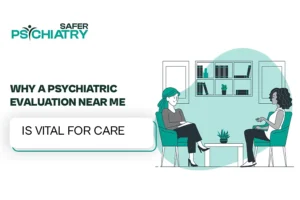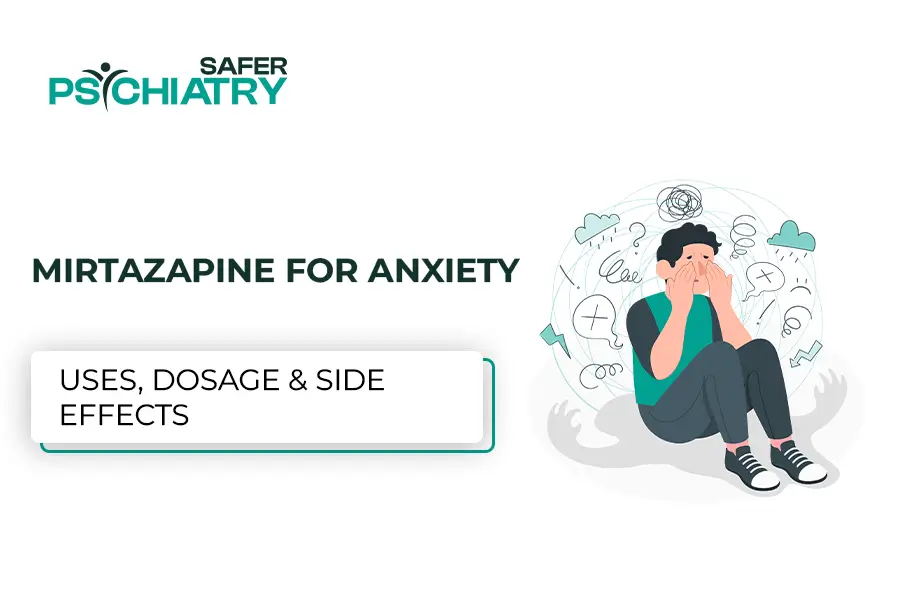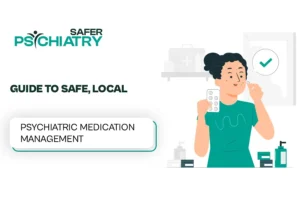
Mirtazapine for Anxiety A Complete
2025 Guide
At Safer Psychiatry, we provide compassionate, evidence – based mental health care to support your well-being now and for the future – because your journey matters, and so do you.

Mirtazapine (Remeron) is an antidepressant often prescribed off-label for generalized anxiety disorder, panic disorder, and social anxiety disorder. It works by increasing serotonin and norepinephrine activity while blocking histamine, which provides both mood regulation and calming sedation.
- Dosage: Common starting dose is 15 mg nightly; some patients begin at 5 mg for sleep, with typical ranges of 15–30 mg.
- How it helps: Reduces anxiety, improves sleep, and stimulates appetite—especially helpful for anxious patients with insomnia or weight loss.
- Time to effect: Sedation may start within days; full anxiety relief usually takes 4–6 weeks.
- Side effects: Weight gain, drowsiness, dry mouth, constipation.
- Best for: Patients with anxiety who also have sleep or appetite problems, or those who did not respond to SSRIs.
Always consult a psychiatrist before starting or adjusting mirtazapine.
What Is Mirtazapine Used For?
Mirtazapine is FDA-approved for major depressive disorder but is widely prescribed off-label for anxiety. Because of its unique mechanism and sedating properties, it can be especially helpful for:
- Generalized anxiety disorder (GAD)
- Panic disorder
- Social anxiety disorder
- Anxiety with insomnia or appetite loss
Unlike SSRIs (like sertraline or Escitalopram), mirtazapine has stronger effects on sleep and appetite regulation, making it a good fit for anxious patients who also struggle with insomnia or unintentional weight loss.
How Mirtazapine Works in the Brain
- Boosts serotonin and norepinephrine: By blocking specific brain receptors, mirtazapine increases the levels of mood-regulating chemicals.
- Sedating and calming: Blocks histamine receptors, which explains why it often helps with sleep and reduces physical tension from anxiety.
- Different from SSRIs/SNRIs: Its dual mechanism may work for patients who don’t respond well to traditional first-line antidepressants.
Mirtazapine Dosage for Anxiety
- Starting dose: Often 15 mg at night.
- Lower dose (7.5 mg): Sometimes used for patients very sensitive to medication or when sleep is the main issue.
- Standard range: 15–30 mg nightly.
- Higher doses (30–45 mg): May be considered if anxiety symptoms remain after several weeks.
Important: Sedation is stronger at lower doses (7.5–15 mg). At higher doses, the activating effects can balance out the sedation.
How Long Does It Take to Work?
- Early effects (1–2 weeks): Many patients notice better sleep and reduced restlessness.
- Full effect (4–6 weeks): Consistent anxiety relief usually requires several weeks.
Common Side Effects of Mirtazapine
Most patients tolerate it well, but side effects can include:
- Weight gain & increased appetite (common, sometimes helpful if weight loss is an issue)
- Drowsiness / sedation (especially at lower doses)
- Dry mouth
- Constipation
- Mood changes (rare – should be reported immediately)
Best Combinations with Mirtazapine for Anxiety
- Venlafaxine + mirtazapine: Sometimes used for resistant anxiety and depression.
- Propranolol + mirtazapine: May be used when anxiety includes physical symptoms such as palpitations.
- Never combine without medical supervision—risk of serotonin syndrome or excessive sedation exists.
Who Should Consider Mirtazapine?
Good candidates include:
- Patients with anxiety + insomnia
- Patients with anxiety + appetite loss / weight loss
- Patients who haven’t responded to SSRIs/SNRIs
- Patients who prefer a medication with nightly dosing
It may not be the best choice if:
- Avoiding weight gain is a priority
- Daytime sedation significantly impacts functioning
- The patient requires a very activating medication
When to Talk to a Psychiatrist
You should see a psychiatrist if:
- Anxiety symptoms persist despite SSRIs/SNRIs
- You have severe sleep disruption or weight loss with anxiety
- You’re considering combination therapy (e.g., venlafaxine + mirtazapine)
- You experience side effects that interfere with daily life
Final Thoughts
Mirtazapine can be a highly effective off-label treatment for anxiety, especially in patients who also struggle with insomnia or weight loss. With proper psychiatric supervision, it can improve both physical and emotional symptoms of anxiety.
At Safer Psychiatry (2025), we help patients find the right balance between effectiveness and side effects. If you’re considering mirtazapine for anxiety, talk to your provider about whether it fits your individual needs.
This article is for informational purposes only and is not a substitute for professional medical advice. Always consult a licensed healthcare provider before starting or changing medication.
Contact our clinic today to schedule your anxiety consultation.
FAQ
Frequently Asked Questions
Is 7.5 mg of mirtazapine enough for anxiety?
Yes, some patients start with 7.5 mg at night to help with sleep and anxiety symptoms. However, most people need 15–30 mg daily for full anti-anxiety effects.
What is the best combination with mirtazapine for anxiety?
Doctors sometimes combine mirtazapine with SSRIs, SNRIs, or propranolol to improve results, especially if anxiety symptoms are only partially controlled. Always check with a psychiatrist before combining medications.
How long does mirtazapine take to work for anxiety?
The sedating effect may appear within the first few days, improving sleep quickly. For full anxiety relief, it usually takes 4–6 weeks of consistent use
Is mirtazapine better than SSRIs for anxiety?
It depends. SSRIs are first-line for anxiety, but mirtazapine can be better for people who also struggle with insomnia, low appetite, or weight loss.
What are the common side effects of mirtazapine?
The most common side effects include drowsiness, weight gain, increased appetite, dry mouth, and constipation.
Our Company
Copyright © 2024 Safer Psychiatric Consulting Services


